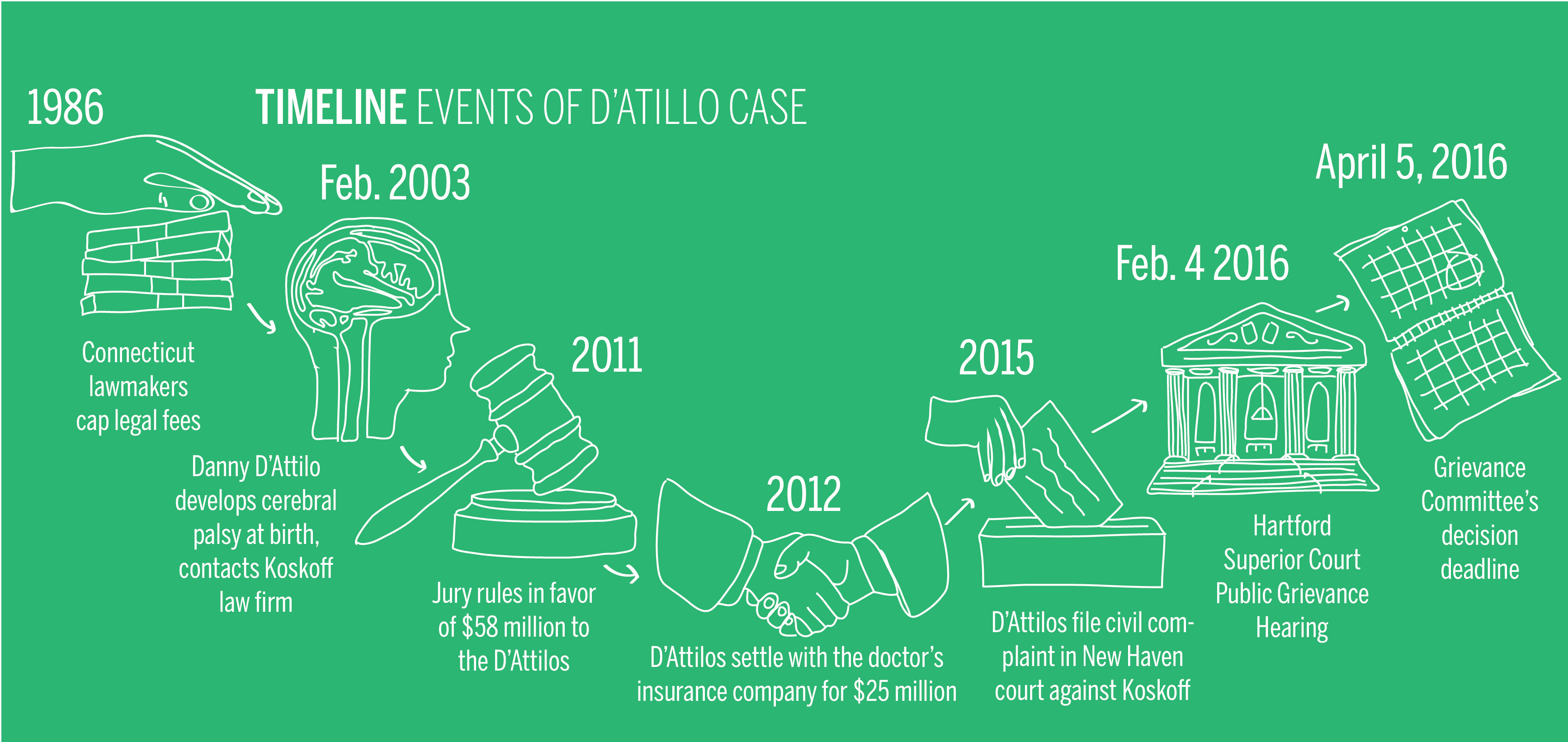
The Connecticut couple who won a record-breaking $25 million in a 2003 lawsuit against the doctor who severely injured their newborn son’s brain was back in court Thursday morning, accusing the lawyers who won their case of defrauding them of millions in legal fees.
In the halls of the Hartford Superior Court, Dominic and Cathy D’Attilo attended a public hearing that will determine whether the state will reject or accept their plea against Kathleen Nastri, one of several attorneys at the acclaimed medical malpractice firm Koskoff Koskoff & Bieder whom they claim behaved fraudulently and misrepresented the financial terms of their agreement.
Dominic D’Attilo and his wife Cathy won an enormous sum in 2012 after their son Danny was born with permanent brain damage and a shortened life expectancy due to a mismanaged delivery. But during the legal proceedings that brought them justice for their son’s injury, the parents allege that seven attorneys unlawfully took $4.34 million from their $25 million settlement fund. The parents’ civil complaint, which was lodged in the New Haven Superior Court in February 2015, appeals to a 1986 state law that limits how much attorneys can charge their clients in legal fees.
“The documentary evidence establishes that the [attorneys] acted in concert to defraud the D’Attilos out of millions of dollars,” reads the civil complaint.
From its beginnings in the New Haven Superior Court, the D’Attilos were advanced to the Statewide Grievance Committee in Hartford — which will decide the case within 60 days — for Thursday’s hearing. The couple argued that their attorneys documented, but did not keep the receipts of the transactions for over $600,000 in litigation expenses, on top of the $4 million they charged in legal fees. But when the D’Attilos brought their case before the court, the court offered to merely reprimand a few of the lawyers and settle the case.
Legal malpractice attorney Howard Altschuler, who is representing the D’Attilos, said his clients oppose this deal. Altschuler said a decision in the defendants’ favor could negatively impact others who use the state’s appeals courts system.
For Altschuler, the outcome of Thursday’s hearing will determine “the public’s confidence in the integrity of the attorney discipline system in Connecticut.”
The Thursday hearing lasted nearly three and a half hours, with both Altschuler and the Koskoff attorney speaking for an hour each.
“There’s a lot riding on this case,” Altschuler said. “For them to settle this is seriously bad.”
Altschuler cited past instances when the Koskoff firm had been in non-compliance with accounting procedures.. He added that it is very difficult for him to speculate on how the state grievance committee, which is composed of two volunteer attorneys and one citizen, will decide.
Evidence Altschuler presented to support the D’Attilos’ case includes the earnings of an independent expert hired by Koskoff who usually earns around $23,000 from each case they work on. This attorney was found to have made $68,000 from the D’Attilo case, Altschuler said.
Tensions flared on Thursday as attorneys on both sides of the case repeatedly interrupted each other. At one point during the hearing, the committee had to take an unscheduled recess to calm down.
“I wasn’t giving ground,” Altschuler said.
Altschuler said he is adamant that Connecticut’s grievance filing system is in need of reform, adding that he hopes this could be the case that sparks further investigation into the state’s system.
Amid the confusion of the public grievance system, Altschuler is seeking legislative ways to fix systemic problems in how grievances are filed and appealed. Earlier this month, he met with Connecticut state legislators, who said they would be requesting that the General Assembly’s Judiciary Committee hold a hearing on the state’s entire grievance system.
“This is a new area of law,” he said. “There’s no guarantee about what happens.”
Chief Disciplinary Counsel Karyl Carrasquilla — who oversees the state office that keeps legal records of Connecticut lawyers — said that once a panel in a local jurisdiction finds “probable cause” in a grievance, it is referred to her office. For cases with probable cause, the Chief Disciplinary Counsel’s Office has the legal authority to investigate and prosecute the case on behalf of the state. If no probable cause is found, the grievance must be dropped.
Carrasquilla said she could not comment on the hearing. She added that there is no way to predict how a case will turn out.
“It depends on the case,” she said. “There’s not a normal.”
For the D’Attilos, Thursday’s hearing is another chapter in a yearslong legal battle that began with the birth of their son, who is now 13.
Altschuler said the D’Attilos appear to be the victim of a system of attorney self-regulation that is turning a blind eye to allegations of unethical conduct.
“This is difficult for them. They’ve been through a lot,” Altschuler said. “This is all supposed to have been resolved.”
The Connecticut Superior Court has 13 judicial districts.
Correction: A previous version of this article misidentified the independent expert who the Koskoff form hired for a Koskoff employee. It also incorrectly stated that the Koskoff firm did not document litigation expenses; in fact, the firm documented the expenses, but did not keep the paper receipts of the expenditures. Furthermore, Altschuler was misquoted as saying the Koskoff firm had been accused of overcharging, when in fact the firm had been found to be in non-compliance with accounting procedures.
Interested in getting more news about New Haven? Join our newsletter!







